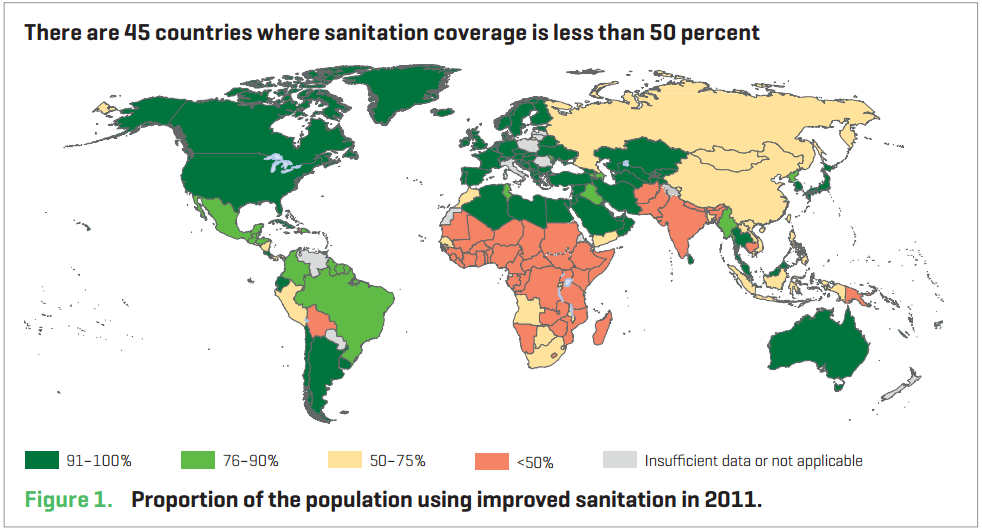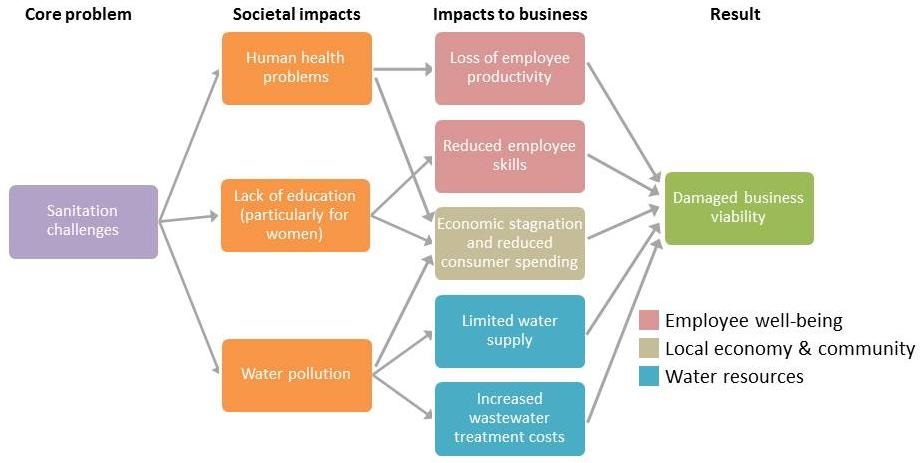By Peter Schulte, Research Associate
August 9, 2013
Sanitation is quickly gaining prominence as one of the most important development challenges of the 21st century. This status is well-deserved: 2.5 billion people in the world do not have access to adequate sanitation. Inadequate sanitation is known to cause chronic health and nutrition problems, prevent children (especially girls) from receiving education, and contribute to water quality/access challenges and ecological degradation. Children living in households with no toilet are twice as likely to get diarrhea as those with a toilet. In the Global South, around 90% of sewage is discharged untreated into rivers, polluting freshwater sources used by communities, agriculture, and industry.
Figure 1: Percentage of population using improved sanitation in 2011
 (Source: WHO 2013)
(Source: WHO 2013)
Since the CEO Water Mandate was launched in 2008, it has strived to articulate the business drivers for corporate action in support of sustainable water management and identify good practices that help them do so. This year UN Deputy Secretary General Jan Elliason called upon all actors, including governments, civil society, and businesses to commit to measurable action and to mobilize the resources to rapidly increase access to sanitation. The Mandate hopes to answer this call and help encourage meaningful private sector action on sanitation, much like it has done with water. We believe the first step in driving a critical mass of companies to contribute to sanitation efforts is answering one simple, yet challenging question:
What is the business case for corporate action on sanitation?
The business case with respect to water is somewhat obvious. Industries around the globe rely on water as a key input into their production processes and therefore have a strong interest in ensuring water supplies are maintained over the long-term. Further, many businesses use quite a bit of water and create wastewater pollution, often meaning they must manage adverse impacts on water resources if they are to maintain their social and legal license to operate in a given area.
With sanitation, the linkages to business practices are less obvious. First, it’s not clear whether business practices routinely contribute to or are somehow complicit in the sanitation crisis. Second, most companies do not directly rely on sanitation as a key input into their production processes or sell goods or services that are directly related to sanitation practices.
However, the more I’ve explored this question with representatives from Mandate endorsers and NGOs over the last few weeks, the more it has become clear that there are indeed compelling and important linkages between sanitation and business. While companies may not rely directly on sanitation as they do with water, they, at the very least, have a great economic interest in achieving greater sanitation coverage. Here are a few reasons why:
- Managing risks around water pollution: The practice of open defecation often leads to the contamination of rivers, lakes, and streams with human faecal matter, leading to a wide range of human health concerns. From a business perspective, this could lead to increased operational costs in the pre-treatment of water as it comes into the factory and at worst render potential water supplies unusable.
- Improving employee productivity and morale: A lack of sanitation coverage leads to great human health concerns and also often discourages children (and especially girls) from attending schools where toilets are not provided. From a business perspective, this could lead to a loss of employee productivity due to worker illness or a need to care for sick children. A lack of education may also mean that a given community is less equipped for employment over the long-term.
- Driving economic development: Several studies have shown that a lack of sanitation coverage is actually a great contributor to economic stagnation in many parts of the world. Further, UN-Water estimates that for every dollar invested in sanitation, there is a return of $9.1 USD. This indicates that adequate sanitation can be a critical factor in creating an economic environment in which sufficient infrastructure necessary for business is developed and maintained, consumers are more willing and able to spend money on goods and services, and businesses are ultimately better positioned to thrive.
Figure 2: Possible linkages between sanitation challenges and business viability

This, of course, is just the beginning of our exploration of this issue. In the coming months, we hope to incorporate sanitation-related thinking into a number of our projects and develop a white paper that further explores and unpacks the business drivers for corporate action on sanitation. Specifically, we hope to answer the following questions:
- Do business operations have the potential to create adverse impacts related to the human right to sanitation specifically? How?
- What efforts should companies take to support and ensure employee access to appropriate sanitation services? What are the responsibility boundaries regarding employee access to water and sanitation in the workplace and in their homes?
- Might a company have a business interest in supporting the fulfillment of sanitation services specifically. If so, what are these key motivations and drivers?
If you have any thoughts or responses to these questions, please let me know! You can reach me at pschulte@pacinst.org.
Pacific Institute Insights is the staff blog of the Pacific Institute, one of the world’s leading nonprofit research groups on sustainable and equitable management of natural resources. For more about what we do, click here. The views and opinions expressed in these blogs are those of the authors and do not necessarily reflect an official policy or position of the Pacific Institute.


